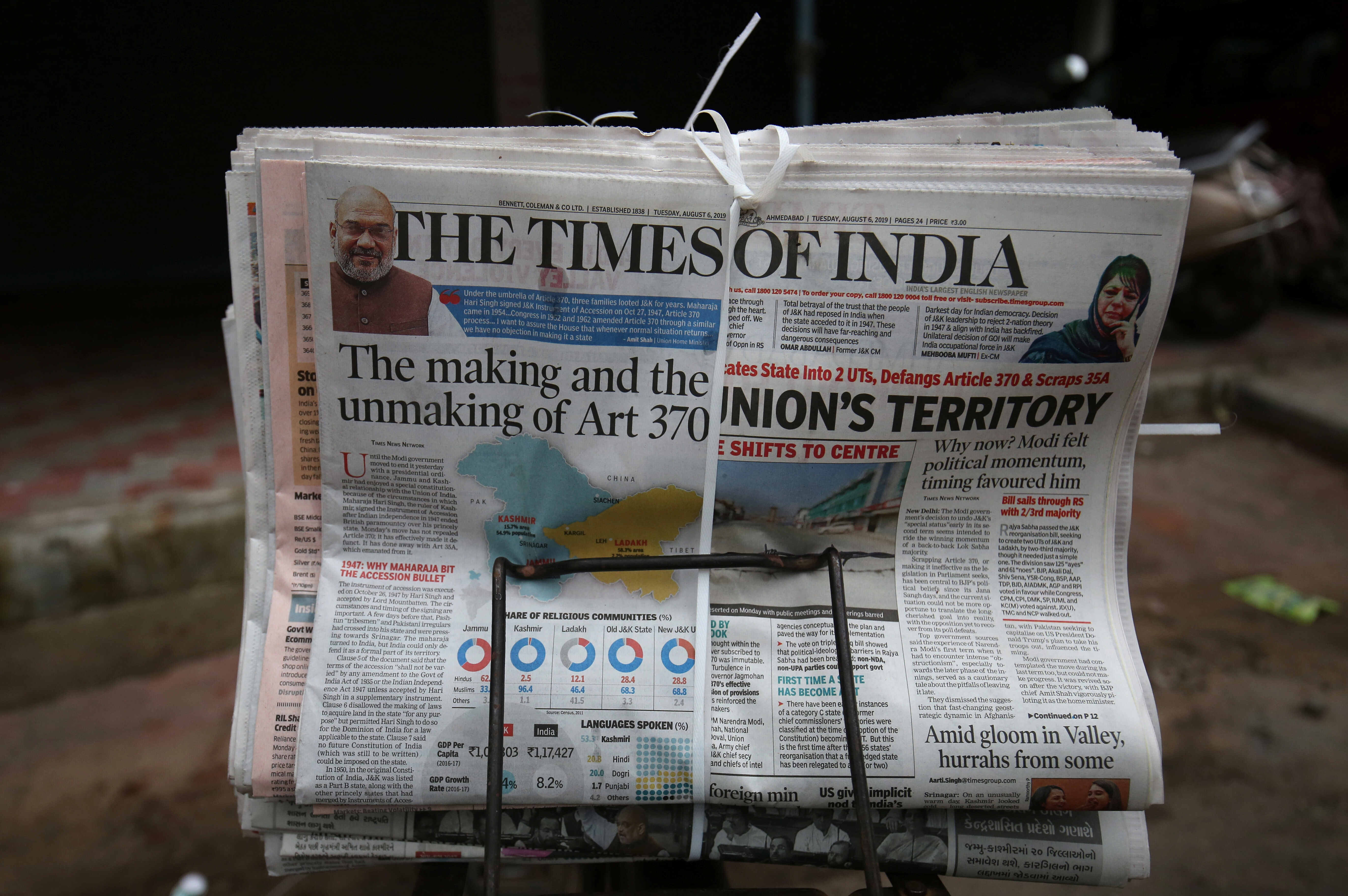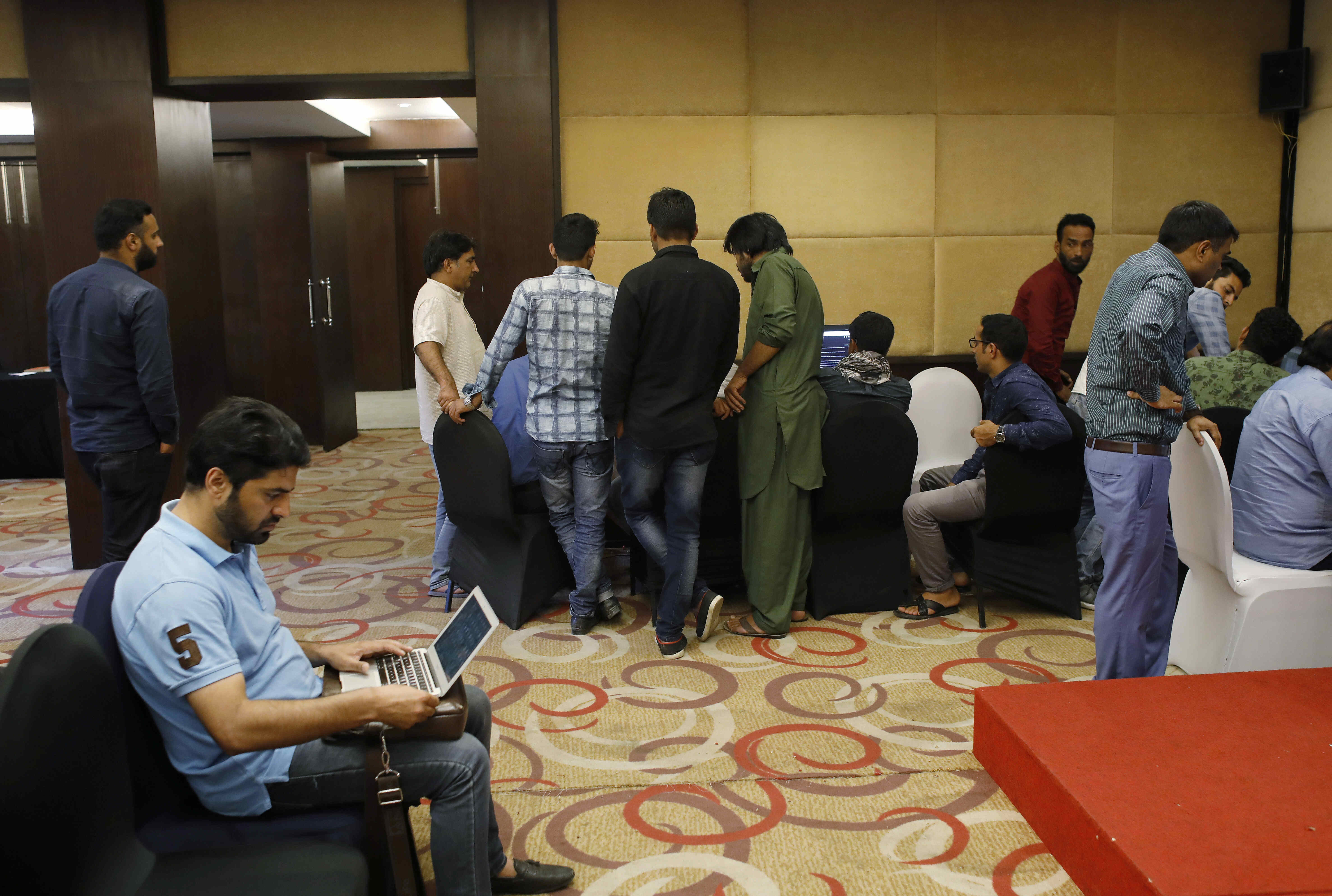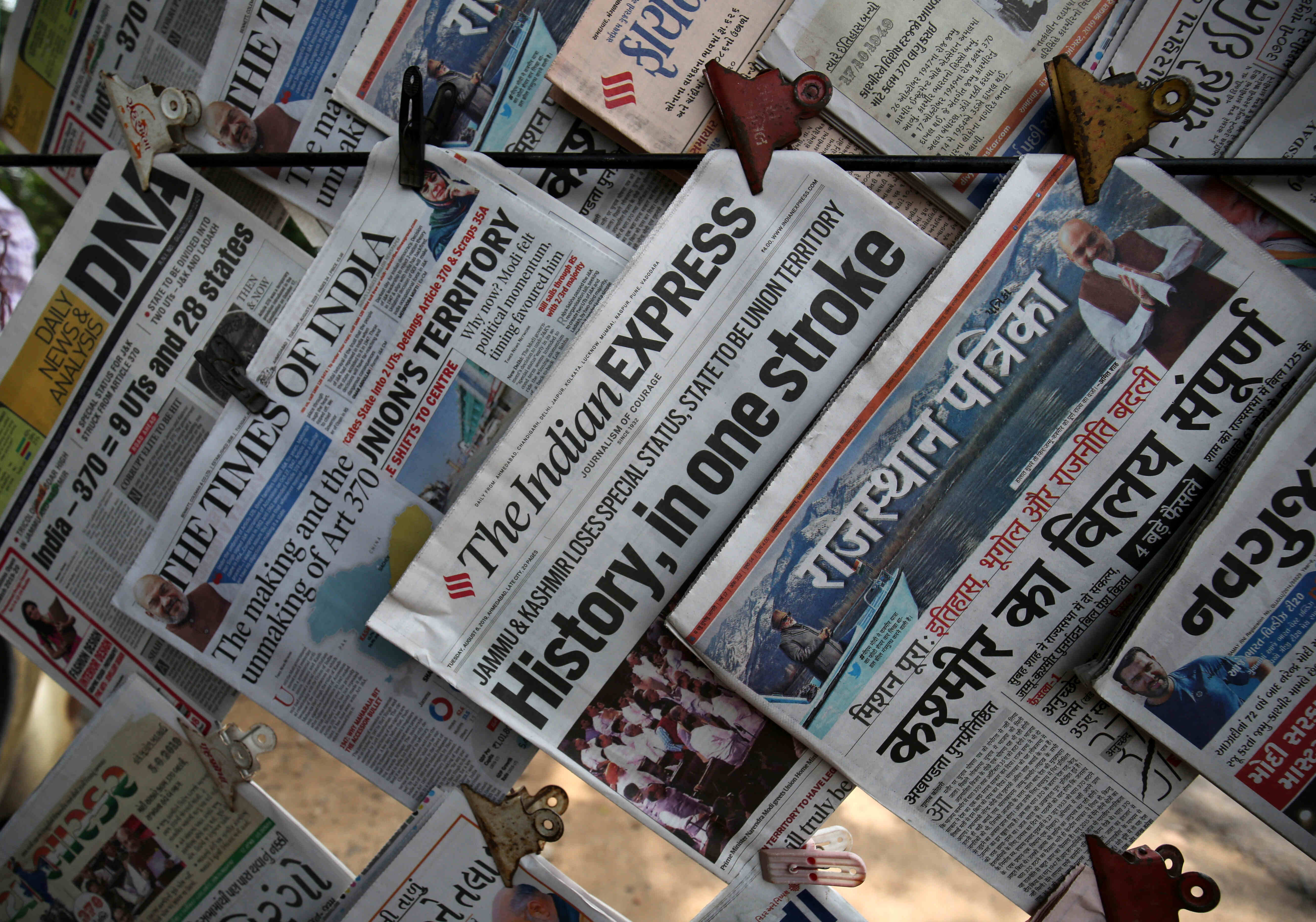Since the revocation of Article 370 in 2019, press freedom in Indian-administered Kashmir has sharply declined, with local journalists facing harassment, surveillance, and charges under anti-terror laws, while foreign correspondents are denied access or deported for critical reporting. These measures, aimed at controlling the region’s narrative and projecting normalcy, have drawn widespread criticism from international watchdogs, who warn of increasing suppression of both domestic and foreign media.
Srinagar, Indian-Administered Kashmir
On a chilly October afternoon, Ahmad, 33, a journalist in in Indian-administered Kashmir with over ten years of experience, received a call from an unknown number.
The caller identified himself a police official asking Ahmad questions about his personal and professional life. This wasn’t the first time. Over the past five years, Ahmad has been receiving such calls every few months, and each time, the caller asks similar questions. “They inquire about what I am doing, where I currently write, the kinds of stories I cover, and even whether I have travelled abroad recently,” Ahmad shared with Al Jazeera, requesting anonymity for the fear of reprisals.
This type of questioning is part of an escalating pattern in Kashmir from last five years, Ahmad says. At least a dozen journalists told Al Jazeera that surveillance from authorities has become more common. “Sometimes we are asked to disclose details about reporting or personal travel, raising concerns over privacy and press freedom. This environment has led journalists to self-censor and avoid topics that are sensitive to report freely,” says Ahmad.
The Kashmir conflict is one of Asia’s longest-running disputes, as both India and Pakistan claim the region in its entirety but both administered parts of it. The two countries have fought two of their three wars over the region. An armed insurgency erupted in the late 1980s against Indian rule which sparked decades of tension. For last three decades, journalists faced threats from both armed rebels and security forces, making reporting highly risky.
In August 2019, the Indian government revoked Article 370, which had provided limited autonomy to the region. This decision led to a security and communication lockdown, silencing local media and severely limiting press freedom. Since then, journalists in Kashmir face intensified surveillance and harassment. Some journalists have been charged under strict terror laws. Journalist watchdogs like Amnesty International and Reporters Without Borders say that press freedom in the region has sharply declined, with international journalists restricted and local reporters frequently scrutinized.
A senior police official defended the verification and called it “a normal process and not a harassment”. “It is a routine process. Some unscrupulous elements masquerade as journalists for the heck of it. Police is bound to find such imposters,” the official told al Jazeera, on the conditions of anonymity, as he was not authorised to speak to the media.
Can the New Government Change this Pattern?
Days after chief minister Omar Abdullah took office, he assured journalists in the region that his government will not do injustice to them.
“I tell media that they are free to criticise me. There will be no injustice to them, or I won’t punish you for writing against my government. We won’t be able to strengthen democracy if we don’t allow media to do its work,” Abdullah stated shortly after assuming office, in a region that has been without a civil government for six years. The new administration will have limited powers, with police and military operations directly controlled by New Delhi.
Abdullah acknowledged that many journalists are struggling to obtain press cards and government accreditation. “We will work to resolve these issues quickly,” he stated.
What Changed After the 2019 Abrogation of Article 370?
The media landscape in Indian-administered Kashmir has dramatically transformed since August 2019, when the BJP-led government revoked the region's special autonomy under Article 370. This long-standing law provided exclusive rights to permanent residents regarding jobs, land, and scholarships.
In the wake of this move, the region experienced a months-long blackout that included a total shutdown of internet and phone services, effectively isolating it from the rest of the world. The lack of access to information made it nearly impossible for journalists to report on the ground realities. Human rights groups have described this as possibly the longest internet shutdown in the world.

“The state aimed to control the narrative and silenced critical voices,” a 45-year-old journalist told Al Jazeera Journalism Review, explaining that journalists now operate under constant threat and fear of detention for their work.
“Also, there are no hopes from the new government that they will provide any relief,” the journalist said.
Since the abrogation of Article 370, there has been a systematic crackdown on the press in Kashmir. Many journalists have been detained, questioned, or harassed by authorities under the pretext of “national security.” Independent media outlets have been particularly targeted, with closures like The Kashmir Walla standing as a stark example. Its editor, Fahad Shah, was released on bail but still faces charges under the stringent Unlawful Activities (Prevention) Act (UAPA).
“This shift has not only impacted local media but also influenced how the broader world views the situation in Kashmir,” the journalist added. “Fewer authentic stories are emerging from the ground, with much of the narrative being controlled by state apparatuses.”
A report by the Free Speech Collective titled Disappeared: Media Freedom in Jammu and Kashmir 2019-24 – A Status Report highlights the growing threats to press freedom in the region. It revealed that in the first two years following the abrogation, more than 40 journalists in Kashmir were subjected to background checks, summons, or raids.
“They are being forced to present themselves to explain their stories, social media activity, and even general movements. Surveillance of their daily lives, including that of their family members, is another form of intimidation,” the report stated.
At least six journalists in the region have faced charges under the UAPA, a stringent anti-terror law that allows detention without trial. Among those still imprisoned are Asif Sultan, detained in 2018 on terrorism charges, and Irfan Mehraj, who was arrested last year while also working as a researcher with a local rights group.
The crackdown on press freedom coincides with a rise in the use of UAPA across India. In 2022, the National Crime Records Bureau reported a 17.9% increase in UAPA cases, with the majority originating from Jammu and Kashmir.
Journalism Under Siege in Kashmir
Another pressure tactic employed by the government in the disputed region has been barring journalists from traveling abroad.
In July 2022, Sanna Irshad Mattoo, a Pulitzer Prize-winning photojournalist from Kashmir, was prevented from traveling abroad by Indian authorities. Mattoo was scheduled to fly to Paris from New Delhi for a book launch and photography exhibition as one of the 10 winners of the Serendipity Arles Grant 2020.
Just a month later, another Kashmiri journalist, Aakash Hassan, was stopped by Indian authorities from flying to Sri Lanka for a reporting assignment. Hassan was the fourth Kashmiri journalist barred from traveling abroad. Al Jazeera spoke to several Kashmiri journalists, most of whom write for international organizations, have reported receiving emails from the Indian Passport Authority informing them that their passports had been suspended without valid reasons. At least 12 journalists have confirmed their passports were revoked.
A request filed on March 15, 2024, by the Free Speech Collective under the Right to Information (RTI) Act sought year-wise, district-wise, and profession-wise data on the number of passports cancelled, revoked, impounded, or surrendered in the region. However, the request was rejected, the group told Al Jazeera. “There is no data in the public domain about this serious violation of the right to mobility,” the Free Speech Collective stated.
For journalists like 29-year-old Deeba (name changed), the pressures of reporting in Kashmir have been profound. Driven by a desire to tell the stories of ordinary people impacted by decades of conflict, Deeba entered the field eight years ago with hope and determination. However, she now finds herself grappling with immense stress, which she describes as the fallout of choosing a career fraught with danger in the region.
“The government of Kashmir has punished journalists both openly and discreetly for their work,” Deeba said.
Despite local and international calls to ease restrictions on journalists, Deeba noted that the government’s approach has remained unchanged. “As a result, critical reporting on human rights and government policies is absent from Kashmir’s newspapers. Local media outlets have been reduced to government gazettes, portraying a rosy picture of Kashmir to the world,” she explained.
She added that many of her journalist colleagues have been forced to leave Kashmir for Delhi and other cities to continue their work after facing threats and finding their professional spaces stifled.
‘Perception Management: Disallowing Foreign Journalists in Kashmir’
Even the authorities have made sure not to allow foreign journalists to report from Kashmir.
Hannah Ellis-Peterson, a correspondent for UK based Guardian newspaper in India while sharing a story about Kashmir elections on X said that no foreign journalists were allowed to go.
Experts say that the Indian government is wary of international narratives that may portray the situation in Kashmir emphasizing on human rights concerns. They say that restricting foreign media access allows more control over the narrative.
The Indian government, particularly after the abrogation of Article 370 in 2019, has taken steps to present an image of normalcy in Kashmir.
“Foreign media coverage might lead to increased international scrutiny of India's policies in Kashmir,” a foreign correspondent based in New Delhi told Al Jazeera on the conditions on anonymity.
During the G20 Tourism Working Group meeting held in Kashmir in May 2023, foreign journalists faced restrictions on their movement and reporting.
“The visit was strictly regulated. This access was confined to the event location and specific pre-planned activities, with heavy security surrounding the areas where we were permitted. Independent travel outside designated zones was largely restricted, limiting our ability to explore and report freely across the region,” the foreign journalist added, who was part of the visit.
Geeta Sesu, the co-founder of the Free Speech Collective told Al Jazeera that It is ironic that the government permits a carefully curated visit of foreign diplomats to Kashmir but will not allow foreign correspondents permission to report independently.
“Even academics are disallowed, and foreign academics are deported. This is part of the government's strenuous efforts to control the narrative and portray normalcy and acceptance of its policies. A truly democratic government will welcome independent scrutiny and comment, not fear and prohibit it.”
Earlier this year, two French journalists who have been working in India for than a decade claimed that the Indian government forced them to return to their home country after denying renewal of their work permits.
It included French journalist Sébastien Farcis, who has been working in India as a South Asia correspondent for the past 13 years and Vanessa Dougnac a South Asia correspondent for 23 years.
Dougnac said she was accused by the Indian government for creating a “biased negative perception” of India through her work.
“There has been a drastic decline in press freedom in Indian-administered Jammu and Kashmir since the Modi government unilaterally revoked the region’s special autonomy status in 2019. Kashmiri journalists routinely face trumped-up terrorism and criminal cases, raids, and interrogations in retaliation for their reporting,”Beh Li Yi Program Coordinator of the Committee to Protect Journalists (CPJ), told Al Jazeera Journalism Review.

Beh said that It is appalling that the Indian government continues to weaponise the security laws against journalists. This includes journalists like Irfan Mehraj and Majid Hyderi, who are currently held under the anti-terror Unlawful Activities (Prevention) Act and the Jammu and Kashmir Public Safety Act respectively.
“They must be freed immediately and unconditionally,” Beh said.
Beh said that the crackdown doesn’t stop with the domestic media.
“Foreign correspondents say they have faced increasing visa uncertainties, restricted access to reporting in the country, including in Jammu and Kashmir, and even threatened deportation in retaliation for critical reporting in recent years,” Beh said.
Beh said that if the Indian government wants to be taken seriously as a ‘mother of democracy’, it must promptly put an end to the persecution, harassment, and arrest of journalists in Kashmir.








































